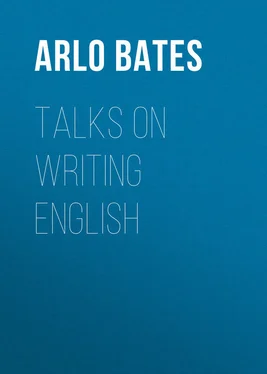Arlo Bates - Talks on Writing English
Здесь есть возможность читать онлайн «Arlo Bates - Talks on Writing English» — ознакомительный отрывок электронной книги совершенно бесплатно, а после прочтения отрывка купить полную версию. В некоторых случаях можно слушать аудио, скачать через торрент в формате fb2 и присутствует краткое содержание. Жанр: foreign_antique, foreign_prose, на английском языке. Описание произведения, (предисловие) а так же отзывы посетителей доступны на портале библиотеки ЛибКат.
- Название:Talks on Writing English
- Автор:
- Жанр:
- Год:неизвестен
- ISBN:нет данных
- Рейтинг книги:5 / 5. Голосов: 1
-
Избранное:Добавить в избранное
- Отзывы:
-
Ваша оценка:
- 100
- 1
- 2
- 3
- 4
- 5
Talks on Writing English: краткое содержание, описание и аннотация
Предлагаем к чтению аннотацию, описание, краткое содержание или предисловие (зависит от того, что написал сам автор книги «Talks on Writing English»). Если вы не нашли необходимую информацию о книге — напишите в комментариях, мы постараемся отыскать её.
Talks on Writing English — читать онлайн ознакомительный отрывок
Ниже представлен текст книги, разбитый по страницам. Система сохранения места последней прочитанной страницы, позволяет с удобством читать онлайн бесплатно книгу «Talks on Writing English», без необходимости каждый раз заново искать на чём Вы остановились. Поставьте закладку, и сможете в любой момент перейти на страницу, на которой закончили чтение.
Интервал:
Закладка:
Coherence, the third principle of structure, is the law of internal arrangement. The relation of each part to the others must be made clear and unmistakable. We are all but too familiar with the style of writing which resembles the valley of dry bones of the prophet’s vision, composition wherein the relation of one fragment to another is to be discerned only by the most careful research. Coherence is as the inspired prophecy of Ezekiel, whereby the bones came together, bone to bone, so that the valley was filled with an exceeding great army.
Unity is at once the simplest and the most easily secured of these three requirements. It is within the power of any writer of reasonable judgment to tell when the matter contained in a sentence concerns a single idea or several ideas so closely connected that they must belong together. It is a matter of perception, and for avoiding incongruous constructions there is perhaps no other rule so good as the simple injunction: Be sure that sentences have Unity. Every text-book upon rhetoric warns against this fault and contains examples of it. The writer who accustoms himself to realize vividly what he is saying is not likely to fall into the error.
The danger attending upon the effort to secure Unity is that of Dryness. The writer who is excessively careful about confining every sentence to a single thought and every paragraph to a single group of thoughts dominated by a central idea is sometimes likely to fail of variety and richness of structure. He becomes timid about admitting even proper ornaments, and gives to his style an air of being constructed upon the model of a wall of brick masonry. Variety is as essential to composition as is Unity, and it is necessary to be careful lest in securing one the other be lost. Every student should become sufficiently self-critical to know in which direction he is more likely to err, and to direct his efforts for improvement accordingly.
The question of Mass is more difficult. This principle governs the places of words and clauses in the sentence, of sentences in paragraphs, of paragraphs in longer compositions. The whole matter is admirably and succinctly put by Mr. Wendell: —
In any composition the points which most readily catch the eye are evidently the beginning and the end. From which, of course, it follows that, broadly speaking, every composition – sentence, paragraph, chapter, book – may conveniently begin and end with the words which stand for ideas that we wish to impress on our readers… Broadly speaking, the office of punctuation is to emphasize, – to do for the eye what vocal pauses and stress do for the ear, – to show what parts of a composition belong together, and among these parts to indicate the most significant. It is clear that periods emphasize more strongly than semi-colons; and semi-colons than commas. From this, of course, it follows that in an ideally massed sentence the most significant words come close to the periods, the less significant close to the lesser marks of punctuation, the least significant in those unbroken stretches of discourse where there is nothing but words to arrest the eye. The test of a well-massed sentence, then, is very simple: Are the words that arrest the eye the words on which the writer would arrest your attention?
The application of this principle to books is easily seen, and perhaps is especially obvious in fiction. In an effective novel it will generally be found that some interesting and striking situation has been chosen for the beginning. Frequently the author makes a bold plunge into the very heart of the story in order to find an impressive passage with which to begin. The more important emphasis, that of the conclusion, must be properly employed or the entire effect of the work as a whole is sacrificed.
A good example of the ill effect of failing to employ the emphatic points of a book properly is afforded by Stanley J. Weyman’s pleasing story, “My Lady Rotha.” The first seven chapters are occupied with an account of the rebellion of a village against its chatelaine and of her flight from her castle to avoid their rage. Once the Lady Rotha is free of the castle, however, the book is devoted to her adventures in a country where the King of Sweden, the great Wallenstein, and numerous other leaders are filling the land with war and danger and bloodshed. To the very end of the tale the reader expects that the narrative will return to the castle, and that there will appear some better excuse for the opening chapters than the need of starting the heroine on her perilous travels; but the novel finishes without going back to the castle or telling how matters were settled there. The book is so badly massed that the very force of its beginning injures instead of aiding the effect of the whole.
In another and better tale by the same author, “A Gentleman of France,” the first emphasis is given to the poverty and undeserved ill fortune of the hero; so that when in time fate leads him to better things the later joy is heightened by contrast with the earlier gloom. I take these two books because they have been widely read of late, but any novel that comes to hand is an illustration of one sort or another.
The danger to be avoided in endeavoring to secure effective massing of compositions is that of artificiality. This is especially obvious in the construction of sentences. In an uninflected language, like English, wherein the relative places of words are necessarily fixed more or less absolutely, it is not easy to re-order the arrangement without giving to the style an appearance of artifice. Dexterously to overcome this difficulty is one of the things which the student has to learn, and perhaps more upon the success with which he is able to do so than upon any other single thing will depend the effectiveness of what he writes.
The third principle of structure, Coherence, is one of which the lack is easily perceptible, but the securing of which is often difficult. The rule is that words closely related by their share in the thought to be conveyed shall be kept together, – and so stated is simple enough. No one, however, is likely to have written even a page upon any subject at all intricate without having to pause to rearrange the clauses of some involved sentence or of some confused paragraph. A great hindrance in the struggle for Coherence, it should be added, is a want of clear perception of what one wishes to say. The position of words is often determined by the choice of shades of expression which are extremely delicate, and unless the writer has an accurate and acute perception of these he cannot be sure of the order of his words and clauses.
It is easy enough to see how the phrases are misplaced in the stock examples of incoherence which are given in the books of rhetoric. Any novice could improve a sentence of this sort: —
He left off his old coat to marry a lady with a large Roman nose which had been worn continuously for ten years.
It takes only a little thought to see the error in the phrase: —
The crowd turns, departs, disintegrates;
where it is evident that the connection is between “turns” and “disintegrates,” and that the crowd departs after it has broken up. Not less obvious, when attention is called to it, is the fault here: —
Lothair was unaffectedly gratified at not only receiving his friends at his own castle, but under these circumstances of intimacy. 2 2 Disraeli: Lothair . Quoted by Professor Hill.
It is not hard to see the difference of meaning between these two sentences: —
So long as men had slender means, whether of keeping out cold or checkmating it with artificial heat, Winter was an unwelcome guest, especially in the country.
So long as men had slender means, especially in the country, of keeping out cold or checkmating it with artificial heat, Winter was an unwelcome guest.
Читать дальшеИнтервал:
Закладка:
Похожие книги на «Talks on Writing English»
Представляем Вашему вниманию похожие книги на «Talks on Writing English» списком для выбора. Мы отобрали схожую по названию и смыслу литературу в надежде предоставить читателям больше вариантов отыскать новые, интересные, ещё непрочитанные произведения.
Обсуждение, отзывы о книге «Talks on Writing English» и просто собственные мнения читателей. Оставьте ваши комментарии, напишите, что Вы думаете о произведении, его смысле или главных героях. Укажите что конкретно понравилось, а что нет, и почему Вы так считаете.












